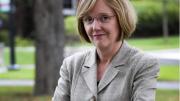On the heels of its doctor of education leadership (Ed.L.D.) degree, inaugurated to train a new generation of practitioners prepared to effect sweeping changes in K-12 education, the Harvard Graduate School of Education (HGSE) is joining with the Faculty of Arts and Sciences (FAS) to overhaul its academic doctoral program, which aims to prepare preeminent scholars of education. The proposal, presented for initial discussion by HGSE dean Kathleen McCartney and academic dean Hirokazu Yoshikawa at the FAS faculty meeting on March 6, and adopted by faculty members' vote at the March 27 meeting, encompasses three concentrations or tracks, each with strong ties to an FAS discipline:
- human development, learning, and teaching (psychology)—addressing such topics as development of the brain and its connection to learning, individual differences in attainment, the impact of teaching practices, how teachers learn pedagogical skills, and the role of technology in learning and teaching;
- culture, society, and institutions (sociology)—concerned with issues such as the effect of cultural, economic, social, and educational practices and institutions on individuals’ and groups’ learning experiences; and mobilizing resources to effect educational change; and
- education policy and program evaluation (economics)—involving the policymaking process, policy implementation and evaluation, and the interaction of social and health programs with education.
As the official FAS explanation accompanying the motion to approve the degree noted:
Education as a field of research has enormous potential to result in the betterment of societies. The rationale for establishing a new interfaculty Ph.D. in Education is to create the first truly University-wide doctorate in education, and position Harvard as the leader in ground-breaking education research that will drive educational change and improvement.
The present Ed.D. thus will be reborn as an interfaculty Ph.D. in education—the seventeenth such interfaculty Ph.D. (a degree conferred solely by FAS). Members of the faculty working group who prepared the draft program included HGSE professors Paul Harris, Bridget Long, Jal Mehta, Catherine Snow, and Yoshikawa. FAS participants included Mahzarin Banaji (psychology), Larry Katz (economics), Gary King (Weatherhead University Professor, government), and Mary Waters (sociology).
FAS’s discussion (which was required before any vote could be taken subsequently) was introduced by Graduate School of Arts and Sciences interim dean Richard J. Tarrant—poignantly, his first official business at a faculty meeting since Allan M. Brandt relinquished the deanship last month to address an illness. Tarrant noted that Brandt had led much of FAS’s participation in developing the proposed new degree, and regretted that he had not been able to present it.
McCartney observed that HGSE is a relatively small school, with just 80 faculty members (about two dozen of them tenured), and that it had found collaboration with other University experts fruitful in preparing its students to deal with formidable challenges in education. (The Ed.L.D. program, which now has two student cohorts enrolled, was designed and is taught in concert with Harvard Business School and Harvard Kennedy School professors.) Nearly four dozen faculty members from other Harvard schools—the majority of them from FAS—had indicated their interest in affiliating with the proposed new Ph.D. program, she said.
Yoshikawa emphasized that the Ph.D. program would enhance HGSE’s ability to provide a powerful curriculum firmly grounded in the social sciences, arts, humanities, data analysis, and experience in educational practices and policy. Each of the concentration pathways would have a foundational core course and required methods courses—all of them interdisciplinary. And the concentrations have a greater thematic focus and curricular sequence than those they would replace under the existing Ed.D. course of study. Among the qualifying courses for each concentration identified in the proposal are, naturally, multiple offerings from the HGSE curriculum, plus many from FAS's anthropology, economics, psychology, sociology, linguistics, philosophy, biology, human evolutionary biology, computer science, history of science, and government departments—and selected Kennedy School, business, law, and public-health classes.
As envisioned, the program would be relatively small, admitting about 25 students per year (down slightly from the current Ed.D. program). And it would finally give HGSE full parity with peer schools of education, all of which already offer a Ph.D. (as Harvard, until now, has not, given FAS’s custody of that degree).
The overwhelming majority of FAS members who rose to speak on March 6—from economics, sociology, history, psychology, government, and other disciplines—favored the proposal, citing the relevance of education issues to their own research, the high quality of the HGSE students already enrolled in their courses, and the benefit to FAS from this new interfaculty venture. Among the latter advantages, professors cited the likelihood that the Ph.D. would attract even stronger students, and that formal connections to HGSE faculty members and doctoral candidates might have the salubrious effect of making FAS members more sensitive to examining and enhancing their own teaching.
When it came time to vote on March 27, those present agreed with all of the above: the new degree program was adopted by unanimous voice vote.









